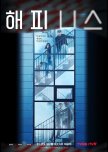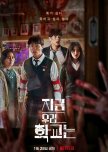
This review may contain spoilers
Music and Lyrics
Soundtrack #1 is my number one feel-good and comfort drama of the year, or any year for that matter. Yes, there have been many great productions in the past but perhaps none as short or as sweet, and certainly as satisfying as this one, as far as friendship and romance-themed stories are concerned.Truth be told, this isn’t my go-to genre and I only watch dramas of this nature probably once or twice a year, if not less. I’ve dropped or put on hold many of such dramas in the past. For 2022, the only one that I’ve completed to-date is 25-21 which is a remarkable production in its own right, but what Soundtrack #1 does so well is how it provides closure in the most satisfying, realistic and inspiringly hopeful and positive manner that most ordinary folks could relate to, in particular those who are going through a similar experience as well. And of course, this drama stars Park Hyung Sik and Han So Hee as the leads. That fact alone provided more than enough motivation to give this one a shot and I’m glad I did.
One of the rising number of K-dramas to be produced and streamed exclusively on Disney+, Soundtrack #1 is based on the original screenplay written by Ahn Sae Bom in what is his first screenwriting credit. Kim Hee Won, the prolific director of dramas including the likes of Vincenzo and The Crowned Clown, serves as director.
What I Liked
First and foremost, obviously the leads. Park Hyung Sik impressed me in Happiness but I was already a fan after the South Korean remake of Suits. Despite having not seen most of his wide repertoire of works, something that I’ll have to remedy in the near future, one could tell how well cast he is in pleasant good guy roles, especially the wholesome boy-next-door kind of vibes. Nothing flashy, OTT or extreme but rather just down-to-earth and ultra low-key type of personas suit his overall demeanour and style of acting. That said, I’m sure he possesses a lot more range that’s just waiting to be unleashed.
Han So Hee took my breath away in My Name. I just had to see more of her and in a completely different setting.The feedback on her performance, especially at the initial stage, wasn’t too promising where many viewers were either not convinced by her chemistry with Park Hyung Sik or felt that her acting was lacking. Personally for me and given the context of the narrative, I wasn’t expecting powerful award-winning type of performances from anyone. The bare minimum for me for a story of this nature is to be convinced of the interactions and connection between the leads. In that regard, I am not disappointed. I really enjoyed seeing how well both leads articulated their roles to imbue much realism into the depiction of a healthy and organic relationship development stemming from the unique backstory that they share.
In terms of the narrative, stories about unrequited or repressed romance with friends-to-lovers and co-habitation themes are a hit or miss for me but in this case, I’ve thoroughly enjoyed the viewing experience. Perhaps it’s because of how much I adore the leads that I bought into the storytelling. Another possible reason is how short it is. Any longer than 4 episodes or the usual 12 or 16-episode format and I might have bailed. But given how compact the structure of the story is and the rather entertaining pace as well as the sequencing of key plot points, I was honestly not bored out of my mind at all.
Another crucial selling point is the production values. From the first minute of the first episode, one could tell this drama has quality written all over it. The magical snowfall effect, the tasteful set designs including the charming little roadside diner, the adorable home that the leads share, the chic photography studio, among others. All of these aspects are presented beautifully with the kind of warm colour palette that makes this a cosy and inviting little drama to savour.
For a drama entitled Soundtrack #1, its soundtrack truly is deserving of the title. Featuring no less than 12 songs, perhaps the ones that speak to me would be the evocative love ballads which are amongst the best that have been released this year thus far.
The full list are as follows:
Kyuhyun (규현) - Love beyond words (사랑은 말로 표현하는게 아니래요)
Park Boram (박보람) - Want to be happy (행복해지고 싶어)
Davichi (다비치) - Your tender heart hurts me (소녀 같은 맘을 가진 그댈 생각하면 아파요)
Kim Jong Kook (김종국) - My Love
Kim Jae Hwan (김재환) - Talk to me (나에게 말해요)
Standing Egg (스탠딩 에그) - Prettiest One (너만 예뻐)
DOYOUNG (도영) - A little more (아주 조금만 더)
Monday Kiz (먼데이 키즈) - Wanna be your lover (이젠 친구에서 연인이 되고 싶어)
LeeHi (이하이) - We'll shine brighter than any other stars (우린 어떠한 별보다 빛날 거야)
SEOBIN (서빈) - Love Love Love
LEE YEJOON (이예준) - Miss You More, I'm Sorry (더 보고 싶고 미안하고 그래)
DOKO (도코) - Love Beyond Words
Final Thoughts
Most aspects are so well executed in this short production that I can’t find many, if any, faults about it. The conclusion to the story is extremely well written which leaves me with such an uplifting feeling. All things considered, this is job well done by everyone involved in Soundtrack #1 and definitely worth checking out or even a re-watch.
Was this review helpful to you?

Hachigatsu wa Yoru no Batting Center de
10 people found this review helpful
Life is Baseball
As the proverbial phrase goes, when life gives you lemons you make lemonade out of them. Or in baseball terminology, when life throws a curveball at you, hit it right out of the park.Hachigatsu wa Yoru no Batting Center de revolves around a mysterious ex-pro baseball player, Ito Tomohiro, who hangs out at a local batting centre helping a variety of female customers deal with their life problems using what he calls Baseball Theory. He is able to discern their predicaments by observing the way they bat and has an uncanny ability of psychologically projecting their psyche into an utterly immersive fantasy world - a baseball stadium where he draws upon his experience in baseball competitions and strategies to deal with their respective problems.
Central to this premise is 17-year old Natsuha Mai, a part-timer at the batting centre and who happens to have her own troubled past. Joining Tomohiro’s efforts in helping these customers enables her to eventually exorcise her own demons.
Running at 30 minutes each, this 9-episode medium-budget production features slice-of-life themes presented in an episodic format that involve the workplace, family and relationship dynamics. Although the themes are not explored with profound depth, as expected of a short series, the storytelling of each story arc is rather engaging and still manages to tug at the heartstrings, particularly in the final episode.
The leads are decently portrayed by Sekimizu Nagisa and Nakamura Toru, as Mai and Tomohiro respectively. A Japanese baseball legend makes a cameo appearance during each episode, along with the multitude of guest stars. The catchy and upbeat J-rock intro and outro themes are performed by CreepHyp, namely Shoumona and Konnani Kanashiinoni Hara ga Naru.
All in all, Hachigatsu wa Yoru no Batting Center de is a well-produced quality short format series which I would categorise as a lighthearted healing drama. The baseball terminology isn’t too challenging to comprehend, provided you have good quality subs, while the life lessons conveyed are contemplative rather than outright didactic. A wholesome viewing experience indeed.
Was this review helpful to you?

A Sanctuary
The beautiful seaside village of Gongjin, with its picturesque landscape, sandy beaches, rustic homes and a quaint red lighthouse that overlooks the vast openness of the ocean. It is the perfect sanctuary for weary travellers and those who seek refuge in its peaceful, idyllic setting. All visitors from near and far are warmly received by its friendly inhabitants with wide smiles, open arms and fresh seafood. Welcome to Hometown Cha-Cha-Cha (where the only thing that’s perhaps missing is a dental clinic).This fictional village truly exists but goes by a different name in real life - it is actually the coastal town of Pohang in South Korea’s east coast. HomeCha is a remake of the 2004 film, Mr Hong, which in turn is based on the original screenplay written by Kang Seok Beom and Shin Jung Goo. The 2021 iteration is helmed by Yoo Je Won (The King: Eternal Monarch and Hi Bye, Mama!) and adapted into the 16-episode drama format by Shin Ha Eun (The Crowned Clown and Argon). Im Ha Young (Oh My Ghost and Search: WWW) serves as music director.
As it was in the movie, Homecha is a rom-com about a girl from the big city who moves to the quiet little village where she meets and falls in love with a local boy. Sounds like the typical fish out of water character in an opposites attract love story except there’s more than meets the eye. In addition to the romance and comedy, this is a healing drama that explores slice of life aspects, from the mundane to the extraordinary, amidst a backdrop of myriad colourful characters and mysterious backstories.
I haven’t watched nearly enough K-drama romcoms to qualify as an expert in this subject but I’m well aware of the associated tropes that are usually present in the genre. This drama is no exception and features a number of such cliches and plot devices in the storytelling, which I don’t really mind because for the most part, they are generally well executed and not OTT. Despite the plot being rather straightforward, it has to be said, it does start off brightly and remains steadily engaging along with a multitude of story arcs and sub-plots involving certain side characters, mainly the residents of the seaside village. It’s not all rainbows and sunshine, however, due to the inclusion of angst and tragic circumstances in the overarching story.
The production is of high quality and the scenic location of the principal photography affords the drama some utterly breathtaking panoramic vistas, largely attributed to the excellent all-round cinematography. The well-rendered night shots particularly at the waterfront and pier deserve praise as well as the art direction and overall interior set designs of the traditional village homes. The action sequences are minimal but the special effects for a significant event in episode 15 are very well executed.
As far as the cast is concerned, Kim Seon Ho shines the brightest as the affable and down-to-earth Hong Du Shik aka Chief Hong. He certainly fits the role to the tee and rounds off his performance with a powerfully emotional delivery towards the closing stages of the drama that is heart-wrenching to witness. Shin Min Ah portrays the FL Yoon Hye Jin who eventually falls in love with Chief Hong. I find the character somewhat lacking in depth and infuriating at times, while her interpretation of the role is merely adequate. She is certainly capable of more dramatic range but seems to be constrained by the limitations of the script. Nonetheless, both Kim Seon Ho and Shin Min Ah do complement each other visually and the chemistry that they share appears convincingly developed. It’s worth mentioning that the production takes full advantage of their similar facial features for viewers to assign the moniker of “dimple couple” to the leads.
Among the supporting cast, Lee Bong Ryun and Kim Young Ok impressed me the most, as Yeo Hwa Jeong and Kim Gam Ri respectively. These two veterans certainly showcased their nuanced portrayals throughout. Despite her limited screen time, Kim Ji Hyun is memorable in her guest role of Seon A, a testament to her stage experience indeed. The child actors are also deserving of praise, especially Ki Eun Yoo as Jang Yi Jun.
The drama features 8 OSTs, the most prominent being its upbeat main theme, Beautiful Sunday which reflects the overall tone of the production. The rest of the soundtrack consists of slow-tempo love ballads.
로맨틱 선데이 Romantic Sunday by Car the Garden 카더가든
어느 햇살 좋은 날 One Sunny Day by Kassy 케이시
My Romance by CHEEZE 치즈
바람 Wish by Choi Yu Ree 최유리
빛이 되어줘 Be the Light by Kim Jae Hwan 김재환
내 기억 속에 남아 있는 그대 모습은 The Image of You (Remains in My Memory) by Sandeul 산들 of B1A4
Here Always by Seungmin 승민 of Stray Kids
행복했으면 좋겠어 I Hope You're Happy by Lee Sang Yi 이상이
HomeCha is generally an easy and relaxing watch that provides sufficient heartwarming and entertaining moments to fill the weekend and in between more serious or darker dramas in the watch list, which was exactly what I did. The story did take a brief detour through a slightly melodramatic and angsty arc, but eventually everything worked out to deliver a much needed HEA ending for everyone involved.
Was this review helpful to you?

Living for Tomorrow
Tomorrow tells the story of a select band of Grim Reapers who perform the exact opposite of the Angels of Death’s conventional job description as we know it. They don’t accompany the souls of the dead to the afterlife but instead seek to ensure that the souls remain very much intact in their current lives. In other words, their sole purpose is to prevent folks (who are intent on dying) from dying.Presented in an episodic format with a series of standalone cases - each story that comes complete with its own unique themes and ambience - against the backdrop of an overarching mystery that spans several centuries in the making. This tale of urban fantasy masterfully blends light comedic undertones with extremely sensitive and serious subject matters, such as the prevailing issue of suicide as well as potential triggers like sexual assaults and violence.
It is not all doom and gloom however as it provides the proverbial “light at the end of the tunnel” by instilling a hopeful and inspiring closure to each featured case that this supernatural team attempts to resolve, at times with adorably hilarious consequences but for the most part, are stirringly emotive.
Based on the 2017 Naver webtoon of the same name by Llama (her nom de plume), this MBC production is helmed by Kim Tae Yoon (his first drama) and Seong Chi Wook (Kairos). The screenplay adaptation is written by Park Ran (What’s Mama) as well as Park Ja Kyung and Kim Yu Jin in what is their first ever drama script. Jo Seong Woo and Won Ho Kyung serve as music directors. Principal photography took place at several iconic locations, amongst others that include Seoul’s Dongjak Bridge, MBC Global Media Center, Yongin Daejanggeum Park, and Jung-gu Freedom Hall.
A total of 5 songs are released as part of the drama’s OST, as follows:
Seunghyup Lee ( N.Flying ) - Red Light
Ahn Da-eun - Don't Leave My Side
Suran (SURAN) - When My Loneliness Calls You
Yoo Hoe-seung ( N.Flying ) - Still love you
Ben - My Only One
What I Liked
Without delving too much into the psychological and mental illness aspects, and having not read the source material, I’m just going to comment on the drama based on its own merits and also the entertainment value that it brings as a webtoon adaptation.
To be honest, this drama is deceptively more profound than I initially expected. It starts off comical and lighthearted before steadily tugging at the heartstrings with the emotions and finally evolving into a full fledged sob story (or stories, for that matter). I usually avoid sad and depressing content, which this drama has plenty of, but I appreciate the way that these elements are conveyed and the overall narrative is one that is ultimately positive even if the viewer has to experience the whole gamut of negativity along the way, if that makes sense. The presentation is powerfully captivating and inducive of no small amount of tears.
Among all the individual cases presented, my personal favourites would have to be the earlier ones involving the singer-songwriter and the old army veteran. That is not to say the others are not as good but rather they are compelling in a somewhat more sobering and gut-wrenching manner. I don’t want to scare people off watching this show but you have to be emotionally and mentally prepared for what is to come.
In terms of the production values, Tomorrow is a high quality offering that utilises many special effects, for obvious reasons and which are decently rendered. I love the aesthetic intro which is accompanied by the stylish opening theme. The costuming aspect is nicely done with a range of contemporary, futuristic and traditional (Joseon) outfits. I particularly like the FL’s styling as well as the overall set-up of the Grim Reapers’ appearances. The classy touch to the design and set-up of their headquarters alongside the more unsophisticated workplace of the Risk Management team provides an interestingly vivid juxtaposition to the roles of the various factions of Grim Reapers in the story.
The extensive cast for this show provides some memorable performances indeed. Kim Hee Sun’s Goo Ryun is a character that possesses more layers than meets the eye at the beginning. There is a remarkable duality in her evolution from being the cold and inexpressive leader of the team to one who is emotionally vulnerable yet enduringly resilient. Rowoon is the biggest surprise for me by showing that since his recent appearance in The King’s Affection, he has grown by leaps and bounds in this show as the ML, Choi Joon Woong. I still think comedy would suit him best but there is certainly potential for versatility and further improvements.
Perhaps the most intriguing portrayal of all is provided by Lee Soo Hyuk as the antagonistic Park Joong Gil. This man would make an excellent villain in any production but he is convincing as an extremely grey character with anti-hero vibes as well. Yun Ji On rounds off the main cast with his depiction of the stoic and deadpan Im Ryung Goo.
Certain supporting and guest cast members are worth mentioning for their unforgettable appearances, including veteran Jeon Moo Sung as the ex-soldier Lee Young Chun, the adorable child actress Noh Ha Yeon, Min Ji Ah who plays Ryung Gu’s mother, and Kim Young Ok as Lee Jeong Mun, just to name a few.
Final Thoughts
I was left breathless at the end of it all. Tomorrow doesn’t really warrant major criticism, in my humble opinion. Perhaps the slight comedic tone might come across as subtly jarring, at least at the start, but that general sense of levity eventually evaporates into something intensely complex and deeply heartfelt, if not agonisingly heart-wrenching. A drama worthy of recommendation but not without due preparation and ample supply of tissues.
Was this review helpful to you?

The End
Rurouni Kenshin: The Final is the fourth and penultimate entry to the live-action adaptation series based on the Rurouni Kenshin manga series by Nobuhiro Watsuki. The final adaptation, Rurouni Kenshin: The Beginning has already been released in Japan while the international release will follow soon after, so hopefully we won’t have to wait long for that.Most of the production team remain the same, comprising the screenwriter-director, cinematographer, composer and costume designer who were involved in the previous 3 instalments. Therefore, we get pretty much the same high-level quality of production and technical execution. Takeru Satoh and Emi Takei reprise their roles of Himura Kenshin and Kamiya Kaoru respectively while Mackenyu Maeda joins the main cast as the primary antagonist, Yukishiro Enishi.
The plot this time revolves around revenge arising from events that transpire in Kenshin’s backstory, the brief revelation of which shall form the basis of the main story for the fifth and final instalment. Themes of love, vengeance and atonement are explored to the fullest as part of the melodramatic undertone throughout. Regular supporting characters take a backseat while the major developments and interactions are focused on the 3 main characters.
Though the plotline is minimalist and simplistic, there are certain unanswered questions that arise during the storytelling which, in the end, do not really matter or impact on the overall conclusion. The closure is clearly defined and, regardless of what happens in the sequel, this is pretty much the end of the Rurouni Kenshin saga. Perhaps certain elements could have been fleshed out more but, all things considered, I’m satisfied with how things turned out amidst the poetic nuances.
As far as the acting is concerned, Mackenyu Maeda’s Yukishiro Enishi gives a compelling portrayal of the tormented soul, despite the seemingly anachronistic vibes (his entire team appears steampunk). There isn’t much more to say about Takeru Satoh and Emi Takei - they already embody the characters that were essentially written for them.
The action, as usual, does not disappoint at all. The choreography of the sword fights and stunts is truly insane and literally takes your breath away. The final duel is one of the best I've seen in recent memory while the multiple "boss-fights" are equally astonishing. Even the closest recent comparison, Swordsman (starring Jang Hyuk) pales in comparison to this amazing spectacle of physics-defying human feats.
At the end of the day, if you’ve been following the Rurouni Kenshin series, then you have to watch the conclusion to the series through this production. For those who are new to the story, if you enjoy action and sword fights, this movie will not let you down.
Was this review helpful to you?

Coming of Age
Itomichi is a fascinating and heartfelt coming-of-age story that revolves around highschool student Soma Ito. Awkward and shy due to the embarrassment of her unique Tsugaru dialect, she keeps to herself most of the time and doesn’t have any friends. She does happen to be an extremely talented Tsugaru-Shamisen musician, a skill inherited from her mother, but due to her introverted personality, she conceals her talent from outsiders. The film will showcase Soma Ito’s journey of growth to realising her potential both as a person and a budding traditional folk musician. The title Itomichi refers to the thread that is used on the finger when playing the shamisen.Yokohama Satoko directed and wrote the screenplay for this film, which is an adaptation of the eponymous novel written by Osamu Koshigaya who specialises in youth themes. Itomichi is her second book to be adapted into a film. Takuma Watanabe (Aristocrats) serves as the composer. The theme song Eden no Shoujo comes from Mishiranu Sekai, the 10th album of Ningen Isu, a Japanese 3-piece rock band. Katsumi Yanagishima (Zatoichi, Battle Royale) is the cinematographer for this project.
Principal photography took place from September to October 2020 entirely in the Tsugaru region of Aomori Prefecture and features scenes of Hirosaki City, Itayanagi Town, Kitatsugaru District, and Hirakawa City. Itomichi won the Best Picture Award and Audience Award at the 16th Osaka Asian Film Festival as well as numerous other awards at the 13th TAMA film Award, 34th Nikkan Sports Film Awards (New Face Award for Ren Komai) and 95th Kinema Junpo Best Ten Japanese Movies (9th placing).
What I Liked
First of all, the narrative and the storytelling approach. This is one of the most intriguing coming-of-age films I’ve seen. I have a preference for slow burn, emotive and inspiring stories when it comes to depictions of slice-of-life with realism and relatability. For me, Itomichi undoubtedly falls within this category, with a dose of Japanese sensibility. In fact, Japanese filmmakers are masters of this distinctive approach to the genre where all elements of the story blend beautifully with the cultural aspects and atmospherics of the setting. Case in point, the juxtaposition of traditional music and modern cosplay which represents the context of this film.
In addition to the direction, other production aspects are equally well executed, which further enhances the quality of the screenplay. The filming locale has a charming appeal that is exquisitely framed by the excellent cinematography. The stunning visuals not only showcase the beauty of the setting but also evoke a somewhat nostalgic mood to the storytelling. I certainly appreciated some of the quiet and delicate moments that conveyed the complexity and depth of emotions despite having minimal dialogue between the characters.
The music in this film constitutes the backdrop of the story and abundantly features the traditional folk themes of the Tsugaru-Shamisen that is native to the Tsugaru region. I’m a huge fan of traditional music and as far as Japanese folk music is concerned, the shamisen is an enchanting instrument that is a favourite of mine. It’s ever present in Japanese jidaigeki productions but rarely, if ever, in contemporary films so I’m utterly thrilled that the beautiful sounds of the shamisen is afforded the spotlight in this story.
Komai Ren impresses as the central character, Soma Ito. Her absorbing portrayal exudes an aura of mystique that gradually draws viewers in, as it did for me. I honestly do think she was the right choice for the female lead, having also been born in Aomori which is the setting of the narrative, and she speaks the Tsugaru dialect fluently. Fun fact: In preparation for her role, she had trained playing the Tsugaru-Shamisen for nine months.
Toyokawa Etsushi, the multiple Japan Academy Award winner and recipient of numerous acting honours, plays Soma Koichi. His experience truly shines even in a supporting role, through his subdued and nuanced interpretation of Soma Ito’s father. Kurokawa Mei portrays the charismatic Kasai Sachiko while Nakajima Ayumu cuts an enigmatic figure of Kudo Yuichiro, the manager of the maid coffee shop. Yokota Mayuu’s headstrong and manga-loving Fukushi Tomomi completes the team of maids.
The final aspect that I have enjoyed immensely is the perfectly executed and extremely befitting ending. There’s nothing more gratifying than a production that sticks the landing flawlessly, complete with a powerful stage performance of the Tsugaru Aiyabushi.
Final Thoughts
Do not be fooled by the poster (at the time of writing, in case it gets changed by MDL). The fluffy vibes are somewhat misleading and completely misrepresent the actual tone of the film. If you’re in the mood for a heartwarming and poignant film with realistic portrayals and enthralling music, then Itomichi would most certainly be worth checking out.
Was this review helpful to you?

Flight 1980 to Honolulu
Everything that you’ve ever wanted to know about the technical and operational aspects of the aviation industry can be found in this movie. But don’t worry about getting confused or overwhelmed because the whole concept is conveyed in layman terms and in a very entertaining manner. The running time of about 100 minutes will quickly fly by without you noticing it.Based on the original screenplay by Yaguchi Shinobu, who also directed the film. Tokusho Kikumura (Ju-on film series) serves as cinematographer while Japanese musician Mickie Yoshino composed and arranged the music, which features Frank Sinatra’s Come Fly With Me as the theme song. Tokusatsu productions’ special effects director Hiroshi Butsuda and VFX specialist Koichi Noguchi (Tokusatsu Research Institute) are involved in the production.
All Nippon Airways (ANA) collaborated substantially on the project through the use of their commercial airliner (Boeing 747-400), equipment, personnel uniforms and hangar at Haneda airport (aka Tokyo International Airport). ANA even contributed their technical expertise to the screenplay and assembled a team to oversee the filming. The director himself researched extensively by travelling to the home of Boeing in Seattle in a bid to ensure the key elements of the story stay true to factual accuracy as much as possible.
This film was heavily promoted where 25 cities and airports all over Japan hosted the marketing campaign in 2008. Additionally the US premiere screening was held at Boeing headquarters in Seattle, Washington and attended by Joseph F. Sutter, the developer of the Boeing 747. The success of this film helped spawn 5 side stories as well as a number of TV programs and books.
What I Loved
I absolutely adore the story and the storytelling approach. I would consider this production as semi-comedic, cheerful with lighthearted undertones, highly educational and definitely moving with a lot of heart and soul. Initially coming across somewhat as a parody of aviation-themed shows, the film gradually settles into a fast-paced and action packed docudrama that consistently holds my attention. I find myself quickly immersed into the multiple perspectives of the myriad colourful characters throughout what has been a truly riveting rollercoaster ride indeed.
The attention to detail in terms of the authenticity of the technicalities involved is quite astounding. In addition to the numerous events that take place at the airport as well as in the airliner en route to Honolulu from Tokyo, viewers are also taken behind the scenes to witness the frenetic activities that go on at the control tower, radar centre and hangar. Real life people are convincingly depicted through smartly-written characterizations that include the pilots, cabin and ground crews, mechanics, air traffic controllers, radar room controllers, operations personnel and even the variety of passengers themselves. Thanks to this movie, I’ve been exposed to new jargon such as purser, pitot tube, birdstrike, and birdman, among others. I’ve even discovered that crows and pigeons are smarter than seagulls which are more likely to crash onto a plane.
Production-wise, the film has aged very well for one that was made in 2008. Neither the visual quality nor the cinematography technique appear dated. The visual effects are generally well rendered, particularly in scenes of mid-air flight. As far as the set designs are concerned, obviously the principal photography took place in an actual plane and the airport, so I have absolutely no complaints on that front.
The film features a large ensemble cast with many familiar faces and each of the portrayals are afforded almost equal screen time. For the most part, the extended focus is on Ayase Haruka and Tanabe Seiichi, who are credited as the leads in their respective roles of the inexperienced flight attendant Saito Etsuko and the young pilot, Suzuki Kazuhiro. I’m a fan of Ayase Haruko who projects a refreshing take with an upbeat and sunny disposition while Tanabe Seiichi delivers a charming and humorous depiction of the Captain-in-training.
Of the supporting cast that caught my attention, the experienced Terajima Shinobu commands the screen with her portrayal of Chief Purser, Yamazaki Reiko. Tabata Tomoko’s Kimura Natsumi is a blur of motion with her lively enthusiasm, and Eguchi Noriko catches the eye with her intriguing air traffic controller, Mizuno Yuriko, despite her limited appearance. Additionally, Ito Aiko mesmerises as Miyamoto Rie, the radar room controller.
Final Thoughts
Do not be fooled by the “fluffy and romcom-esque” poster. Happy Flight is so much more than meets the eye. I was intrigued from the get-go and enthralled all the way to the rousing conclusion of the story. In my humble opinion, this is one of the best-produced, most expansive and detailed contemporary Japanese films I’ve ever had the opportunity to savour. Kudos to the entire production team for a job well done!
Was this review helpful to you?

Exceptional cuisine that is worth a special journey
C’est magnifique! Le Grande Maison Tokyo IMHO is indeed grand and fully deserving of 3 Michelin stars for the wonderful French cuisine featured and also a 10/10 rating for the entire production served.Obana Natsuki is a French cuisine master chef who had always been obsessed with attaining the holy grail of his craft - the 3 stars awarded by the prestigious Michelin Guide. Unfortunately his quest for the ultimate crowning glory is bitterly cut short due to a disastrous diplomatic incident that not only upends his promising career as a celebrated chef de cuisine but also reduces him to a vilified persona non grata of both France and Japan. Fast forward 3 years later, he crosses paths with the vibrant Hayami Rinko, a talented French cuisine chef herself, who rekindles his passion for cooking and reignites his hopes of achieving the ultimate Michelin guide rating once more.
Grand Maison Tokyo is a TBS production that is directed by established directors Ayuko Tsukahara (Saiai, MIU 404), Daisuke Yamamuro (Tenno no Ryoriban, Ouroboros, Jin 1 & 2), and Takahiro Aoyama (Tengoku to Jigoku: Psychona Futari). Based on the original screenplay by one of my favourite Japanese screenwriters, Tsutomu Kuroiwa (Tokyo MER: Hashiru Kinkyuukyuumeishitsu, Unsung Cinderella: Byoin Yakuzaishi no Shohosen) with music score composed by Hideakira Kimura and the theme song RECIPE performed by Tatsuro Yamashita.
A collaboration with the international fashion magazine, Marie Claire, in which the fictional “Marie Claire dining” segment is mentioned throughout. Principal photography took place primarily in Tokyo and Paris. The 3-star restaurant L'ambroisie in Paris and the Japanese French cuisine restaurant, Quintessence (depicted as Gaku in the drama) are featured extensively. Incidentally the Japanese restaurant was awarded the prestigious 3-star rating upon completion of the drama’s airing in 2020. The dishes served by Grand Maison Tokyo were prepared by the 2-star INUA restaurant based in Tokyo, while the supervision for dessert preparation is provided by Hotel Intercontinental Tokyo Bay, which was also used as a filming location for the buffet restaurant in the drama.
The drama won 5 awards at the 103rd Television Drama Academy Awards, namely for Best Picture, Best Actor (Takuya Kimura), Best Supporting Actor (Yuta Tamamori), Best Drama Song (Tatsuro Yamashita, RECIPE), and Best Director.
What I Loved
Everything, really. I was hooked from beginning till the end. This drama has the perfect blend of all the right ingredients to produce an outstanding production with more than sufficient action, thrills, suspense and poignant moments which I have thoroughly enjoyed every minute of.
The premise of the drama is straightforward but the storytelling navigates an intriguing trajectory teeming with layers of sub-plots as well as twists and turns that seemingly never runs out of steam or ideas on how to move the story forward. And moving forward it does at nearly the speed of light with so much agency and urgency during the 11 episodes of its run. The viewing experience itself feels very much like a full course fine dining adventure. A compelling narrative that continuously grabs hold of the viewers’ attention while introducing a concept mostly unfamiliar to the uninitiated - the Michelin guide to the world of French cuisine - amidst the multitude of vividly intriguing character designs that permeate this production. One of the things I love about the characterization in this drama is that none of the so-called antagonists is an outright villain - they are simply morally grey characters with their own motivations and beliefs system operating in the highly competitive and unforgiving hospitality industry.
The technical proficiency of this drama shines through, as evidenced by the high production values and top quality execution. This is particularly true for aspects concerning production and set designs, food videography element of the cinematography, the realism of the content depiction pertaining to kitchen administration, food preparation, cooking techniques and restaurant management. Even linguistics hold prominence here with French being convincingly spoken in the drama by various characters. Likewise the music of this production induces the required atmospherics of the storytelling with an infusion of tasteful classical elements that matches perfectly the cuisine that is presented.
The main selling point of Grand Maison Tokyo, undoubtedly for me, is Kimura Takuya. The character-driven narrative suits this man’s profound ability beautifully and so it proves with his award-winning performance here. Kimutaku isn’t just portraying Obana Natsuki - He IS Obana Natsuki! The depth of the characterization complements the extensive range of the actor producing a masterclass in acting, of which I’ve had the privilege to witness…no, to experience, in this drama.
In Suzuki Kyoka, viewers have the pleasure of seeing a veteran actress that matches the excellence of Kimutaku to enhance the flavours of this drama even further. Having seen her in Okaeri Mone, she exudes similar vibes but there is a wider scope to her portrayal of the co-lead Hayami Rinko here. Her characters have a way of building an emotional connection with viewers and I find myself developing this connection from the very first minute of her appearance. What an inspiring and moving performance from this lady indeed.
Tamamori Yuta’s take on Hirako Shohei catches the eye due to the complexity of the characterization where he is allocated quite a significant portion of screen time. It’s worth mentioning that he is the central character in the spin-off drama, Gura Gura Maison Tokyo. I’m also intrigued by the performance of Onoe Kikunosuke V who plays Tango Manabu, the chef of the rival Gaku restaurant. Tominaga Ai as the editor-in-chief of Marie Claire dining, Linda Machiko Richard, dazzles the screen every time she appears.
Final Thoughts
The highest rating awarded by the Michelin guide is 3 stars, which means exceptional cuisine that is worth a special journey. All things considered, watching Grand Maison Tokyo has been an extremely worthwhile experience personally and represents a special journey in and of itself. For that reason, I’m giving it the highest MDL rating that I believe it deserves. This drama is absolutely “Subarashii”!
Was this review helpful to you?

The wind blows from the west
Our Mojin Xiaowei gang of tomb raiders are back in the third instalment of the web series, which began in 2016 with Candle in the Tomb. Pan Yue Ming, Zhang Yu Qi and Jiang Chao reprise their respective roles of Hu Ba Yi, Shirley Yang and Wang Pang Zi since they were first cast in the first sequel, 2020’s The Lost Caverns.Based on the 3rd volume in the Ghost Blows Out the Light (鬼吹灯) novel series written by Zhang Mu Ye, our three intrepid adventurers’ quest for the elusive Dust Bead (translated as Fowl Dust Orb) continues. Aided by the clues gleaned from the Book of the Dragon Bones which was found in Shaanxi’s Lost Caverns (aka Longling Maze), this time the search takes them to the hidden worm valley of the ancient Western Dian Kingdom, where the mausoleum of its founder, King Xian, is located.
The production crew from The Lost Caverns, led by director Fei Zhen Xiang and screenwriter Yang Zhe, remained in place for this project. Principal photography wrapped up in May 2020 and took place primarily in the exotic Yunnan region of Southwest China.
I’m extremely pleased to say that the overall quality of the production, adaptation and technical execution remains excellent, as it was during the team’s first outing together in The Lost Caverns. The storytelling continues to be compelling and riveting, while the fine balance between character development, witty humour, edge-of-the-seat thrills and dynamic pacing has been expertly maintained to keep viewers sufficiently engaged and entertained.
As is the tradition of the Candle in the Tomb web series thus far, expect great visual aesthetics, well-rendered special effects, widely varied BGM score, awe-inspiring set designs for the catacombs and, of course, no Mojin adventure would be complete without horrifyingly surreal adversaries. The scale of the action, CGI rendering and the overall technical difficulty of tomb raiding have increased exponentially in the drama. The immersion of local culture as well as aspects of Feng Shui and Taoism into the plot setting remains outstanding. This truly is a great example of a well-crafted “single location raid” concept.
This being their second outing together, there really isn’t much left to critique on the performances by Pan Yue Ming, Zhang Yu Qi and Jiang Chao. I honestly believe that retaining the main cast largely helps in preserving the chemistry of the lead characters, thus resulting in a deeper conviction and believability of the portrayed camaraderie. Additionally, it enables viewers to build a stronger connection to the characters in their journey of exploration as well as self-discovery along the way. It certainly did with me.
This has been another hugely entertaining and satisfying viewing experience. Once again the story has not come to the end. The answers found in the worm valley of Yunnan have led to even more questions, thus deepening the underlying mystery. As such, we have two more sequels lined up where hopefully the puzzle could be unravelled, namely The Kunlun Shrine and Raiders of the Wu Gorge. Stay tuned for more thrilling tomb raiding adventures in fascinating faraway locales!
Was this review helpful to you?

Welcome to the house of horrors
This drama is about Mio Meguro, who experiences an extremely bad turn in her life by being fired from her job, kicked out of her house, dumped by her boyfriend and harassed by debt collectors all at the same time. In the darkest moment of her life, she finds solace in a kind soul who offers her refuge in a quaint little traditional share house. But, not all is as it seems….As far as the usual J-Dorama eccentricity goes, this show is not even half as weird as most of the same genre. Although the premise centres around the “youkai” (mysterious creatures of Japanese myth and folklore), spiritual/ dark arts themes with (minimal) elements of horror, this is pretty much a light hearted, comedic and well-acted production.
Koshiba Fuka plays the FL, Mio Meguro and her performance fits the role to a tee. Much like her previous role in Tokusatsu Gagaga, she is adept at playing the shy, timid, soft spoken and unassuming character that makes you want to protect this poor unfortunate soul who gets trampled on by unscrupulous boyfriends, bosses, and basically all other bullies. In addition to the fragile wimpiness, she projects the perfect blend of dramatic acting and comedic timing, thus making her well-suited to such humorous roles.
The supporting cast of the various Youkai are equally fun and entertaining, with the fantastic monster makeup and get-up, which comes across as more adorable than terrifying, during the transformation segment of every episode. This motley crew comprises monsters from tales as old as time, with Oiwa-san, Shutendoji, Zaishikiwarashi, and Nurarihyon as the primary share house occupants. Guest appearances by their comrades in arms come in the form of Okiku, Yomotsushikome, Yamauba and Amabie. Witnessing each of them with their uniquely strange and awesome powers truly is hilarious and mind-blowing.
The OST is provided by Miwa (who guest stars as herself in the final episode) who composed the distinctive J-rock piece, Daitan (check out the MV, which was produced with a unique “Youkai” concept).
I was honestly caught by surprise at how entertaining this show was. The ending was astonishing but hugely satisfying as well. Youkai Sharehouse is a light and easy watch if you’re in the mood for some laughter and fun, with the added insight into traditional Japanese folklore and myth of how the Youkai came into being. Running at only 8 episodes, it won't take too much of your time to indulge and you'll be positively relishing every moment of it.
Was this review helpful to you?

Find Your Happy Place
Contrary to the title, this isn’t a fluffy dramedy/rom-com that’s filled with rainbows, sunshine and lots of happy folks with warm smiles and joyous laughter. Well, not exactly. Happiness is about the onset of a zombie outbreak. At first glance, the story appears to be the antithesis of happiness but there’s more than meets the eye. Different viewers would have their own takeaways from this drama but personally for me, my interpretation of “happiness” in this context lies in cherishing what you have amidst the chaos that threatens to take away that which you hold dear, and those whom you so love. For this very reason, this surprising gem became a sort of happy place for me as I began to develop a fondness for the drama and the characters in it, despite the macabre premise.The director of Stranger, one of my all time favourite dramas, Ahn Gil Ho helms this production. The plot is based on the original screenplay by Han Sang Woon. Of his previous works, I’ve only seen The Good Wife which is a decent adaptation of the original US series. The drama is set in the near future that makes references to the post-Covid pandemic. Principal photography took place primarily at the extensive e Pyunhansang apartment complex in Gyeonggi province’s Okjeong city, which is used as the fictional Seyang Forest Le Ciel apartments in the drama.
Happiness focuses on a couple who find themselves under lockdown in their brand new apartment complex during the zombie outbreak, termed “Madness Epidemic” by the authorities. The ML is a Violent Crimes detective of the Seyang Police Station while the FL is a Special Operation Unit (SOU) police squad and counter-terrorism operative. Central to the plot is how these two individuals work with a shadowy governmental agency, Disaster and Crisis Response Center, led by a very mysterious SML, who coordinates the military in the zombie crisis containment and medical researchers’ efforts in finding a cure for the epidemic.
In addition to the character study into the best and (mostly) worst of human nature in the face of impending doom, the narrative contains elements of social commentary and presents a somewhat satirical depiction of a deeply hierarchical society, particularly through the class distinctions between the affluent owners living in the upper levels and the general public in rental housing of the lower levels of the apartments. Themes of apocalyptic dystopia and high-level corruption while tropes concerning childhood connection, contract marriage, and friends to lovers are all present in this drama, among others which I won’t mention further to avoid spoiling. Additionally, jump scares feature quite a fair bit in a number of scenes.
For what appears to be a moderately budgeted drama, I have no major complaints in terms of the production values, design and quality. The fight choreography is quite impressive and so too the presence of the military elements and use of firearms in the action sequences. The makeup for the zombies, including blood and gore, appear well rendered. As most of the story takes place at the apartment complex, there isn’t a sense of the scale of the outbreak, which purportedly occurs nationwide and also across the world. This means there are no massive numbers of extras posing as zombies and running riot all over the place, like scenes in Train to Busan or the sageuk-zombie fusion, Kingdom.
Generally I’m quite pleased with how the story is presented, in terms of the plot development and pacing, sequencing of events in a linear fashion and with minimal disruptions to the timeline i.e. lack of excessive flashbacks of backstories and jumping between different time periods. While there are some similarities with another apocalyptic drama, Sweet Home, the notable differences being the apartment building here is much bigger and the action also takes place outside the building but within the expansive complex that houses several apartment towers. The sheer number of people involved as far as the inhabitants are concerned as well as the external forces outside the complex are much higher. I would say the atmosphere in the drama isn’t as bleak or toxic but instead rather pleasant, were it not for the pesky zombies.
A majority of the characters are quirky and out-of-the-box, which is part of the drama’s charms. I have come to love all three leads and certain supporting characters, in particular a certain little girl. Other characters are those that I either despise or feel perturbed by, but that is testament to the characterization. Most of the supporting characters get their fair share of screen time and story arc. Some characters, however, such as the female soldier who assists the SML in his endeavours and the FL’s colleague in the SOU, unfortunately do not get fleshed out for our benefit. The bureaucrats and chaebols connected to the zombie outbreak also do not make their presence significantly felt until the tail end of the drama, which appears more as an afterthought rather than any crucial aspect of the storytelling.
As far as the acting is concerned, this is where Happiness shines through. The ML Jung Yi Hyun is played by Park Hyung Sik who returns in his first drama appearance since being discharged from military service. Since I last saw him in Suits, he retains that exact same boyish charm and projects the level-headed calm and sensible persona that we have come to expect of his characters. Along with a strapping physique, he certainly looks the part of a violent crimes detective. Han Hyo Joo, who plays the FL Yoon Sae Bom, also makes a return to the small screen this year after last appearing in W in 2016. Among all the lead characters, the FL is quite possibly the most offbeat of them all. Fearless, daring, streetwise and without a care about authoritative structures or social constructs, this is an independent woman who knows what she wants and how to achieve it. She might appear nonchalant and apathetic at times but deep down she has a clear distinction between right and wrong, and has a strong sense of protectiveness over those whom she deeply cares for. All these qualities are magnificently portrayed by Han Hyo Joo.
These two characters are the best part of this drama for me. They’re not perfect, far from it in fact. Their occasional catastrophic decision making counts among other seemingly ridiculous flaws which manifest over time but still I couldn’t help but root for them to overcome all the challenges and dangers that come their way. Their dynamics are top quality where every interaction, even inaction at times, between them truly is a joy to behold.
The SML is played by Jo Woo Jin, no stranger to the industry who has appeared in many renowned drama and film productions over the years. It is a blessing indeed for us viewers that he graces this drama with his presence. The role of the extremely grey and layered Han Tae Seok suits this man to a T, where his understatedly nuanced performance breathes life into the character to further elevate the drama.
Among the supporting cast, special mention has to go to Baek Hyun Jin. This is the third time I’ve seen him this year, after Taxi Driver and The Devil Judge. Known affectionately as the “U-data guy” for his OTT portrayal of a psychotic CEO in Taxi Driver, this actor simply excels in portraying antagonistic roles. In this drama, his character of Oh Joo Hyung is much more subdued in comparison with his previous roles but still does not detract from the lowkey villainous vibes that he consistently imbues into his acting. Bae Hae Seon is another one who has had a prolific year after appearances in Inspector Koo, Hometown CCC, and Great Shaman GDS, of those I’ve seen. She plays the hubristic and self-important “Queen Bee” of the apartment complex, Oh Yeon Ok. Her portrayal here is angsty yet amusing at the same time. Prolific child actress, 9-year old Song Ji Woo who plays Park Seo Yoon, the sickly little girl living on the 5th floor certainly deserves mention for her efforts in the drama.
Happiness introduced me to a number of new musicians who enhanced the production with their evocative music. Joe Layne with the very fitting opening theme and an emotional English-language track, while SAAY, Isaac Hong and Jemma contributed a song each. The original score is composed by multiple award-winning Kim Tae Seong who has form with this genre, having worked on numerous suspense-thriller productions over the past decade.
Eureka (Opening theme) and What Lies Ahead - Joe Layne (조레인)
Pain - Isaac Hong (홍이삭)
Nobody Knows - SAAY (쎄이)
ENIGMA - Jemma (젬마)
IMHO, Happiness is definitely one of the biggest surprises of the year, as far as K-dramas are concerned. It’s not as big budgeted and extensively promoted as some of the more well-known productions and the horror theme involving zombies may have turned off some viewers from trying this one out. But I’m glad I gave this a go and what a fulfilling, entertaining and worthwhile viewing experience it has been. If you can overcome your fear of zombies, do give this drama a chance and, who knows, you might end up being pleasantly surprised as well.
Was this review helpful to you?

Dying is easy, surviving is hard
All of Us Are Dead is adapted from the serialized Naver digital webtoon entitled Now at Our School, which was written by Joo Dong Geun and published from 2009 to 2011. I haven’t read the webtoon but it reportedly consists of only nine chapters. Therefore it would probably stand to reason that the live-action adaptation has expanded on its lore, especially when Netflix is involved where the potential exists for a series to be renewed for a second season, depending on the success of the first season.The drama is co-directed by Lee Jae Gyoo, who won a Baeksang for Damo and directing honours for Beethoven Virus, and Kim Nam Soo. It is based on the screenplay adaptation written by Cheon Seong Il, the screenwriter for Chuno and The Pirates. Principal photography took place from June 2020 to February 2021, which was prolonged due to the Covid-19 outbreak during filming.
In a nutshell, the story revolves around a group of highschool students who are trapped at their school, the ground zero for the onset of a zombie virus outbreak. The drama depicts them fighting to survive both the zombies and virus infection while waiting to be rescued. The rating classification for this production is R-18 and aside from the expected zombie action and gore, certain trigger warnings are present in the form of bullying violence that even borders on sexual assault.
In a recent interview with director Lee Jae Gyoo via the online presentation of the production in South Korea on 26th January, he had intimated that this drama would be uniquely distinct within the K-drama zombie genre that has become commonplace in recent years. According to him, All of Us Are Dead features thought-provoking themes that add a different meaning to a zombie apocalypse, where the focus is on the choices young students make at the boundary between life and death. In addition, the story also provides a satirical take on South Korea's educational system and school space.
What I Liked
I love the K-drama zombie genre and anything closely or even remotely associated in the form of mutants, monsters and the like, complete with the horror, action, adventure tags whether in contemporary, sageuk or fantasy settings. As much as I’ve enjoyed the recently aired Happiness, my preference for zombies leans towards the more feral variety with hordes of them rampaging through the populace annihilating anything and everything in their path, in the mould of Train to Busan (which gets a shoutout in this drama), Kingdom and Rampant. Call me sadistic but I’m all for epic levels of productions with economies of scale in delivering the exhilaration of the action, thrills and suspense, along with all the emotive aspects of human drama as well. Based on what I’ve seen of the depiction of zombies in this drama, it manages to convey all of the above, and has successfully fulfilled most, if not all, of my expectations.
A co-production between JTBC Studios’ Film Monster and Kim Jong Hak Production for Netflix, the quality of the technical execution is beyond doubt. No effort or budget was spared as even a huge four-storey set was constructed as the setting of the fictional Hyosan High School. The money was very well spent indeed as the production design looks top notch with all the nitty gritty details providing an intriguing backdrop to the zombie outbreak. The zombies themselves are deftly manifested in terms of the makeup, special and sound effects, as well as the blood, gore and contortions which complement the extensive range of expertly choreographed sequences.
The cinematography is deserving of praise with the crucial aspect for productions of this nature being the calibre of the camerawork, which for the most part does not let me down (or induce nausea). The well rendered scene transitions are testament to the standard of editing as well, where it’s worth mentioning that the chaotic scenes at the cafeteria and library involving 200 or so extras are reportedly the result of a single-take shooting.
As far as the narrative is concerned, the premise of a school-based zombie outbreak is refreshingly new to me. Some viewers may associate elements of Dark Hole to be of similar vein but personally it really isn’t despite the comparable vibes. While I wouldn’t consider the overall plot trajectory as particularly inventive or groundbreaking, what distinguishes this drama from most others that I’ve seen is the storytelling approach.
In addition to the multiple POV perspectives of the main characters, the screenplay takes its time to explore the origins of the zombie outbreak and motivations behind the actions resulting in the said virus being unleashed on humanity. The depiction of characters dealing with the tragic circumstances in the aftermath certainly elicits an emotional response as well.
True to the director's word, this drama tackles both existing and hypothetical societal concerns which provide added dimensions to the storytelling. Among the thought provoking themes incorporated into the storytelling - unchecked and unmitigated school violence, the ingrained hierarchical social order within a society segmented by wealth and power, the deeply polarised mindsets of the local government and communities in the event of an apocalypse or the aftermath of a mass casualty event. The role that technology plays in binding all these themes together is tackled as well in the form of the ever increasing reliance on and abuse of social media as an outlet that fuels the dissemination of actual and fake news.
The infusion of a number of side stories, character arcs and a narrative that steadily evolves as the drama progresses helped to allay my initial concerns of the story sustaining its momentum over 12 episodes. The dynamic between characters giving rise to various forms of conflicts, teen angst, and even hints of romance contribute towards preserving an atmosphere filled with tension and suspense. That said, I do think the drama could have been slightly shortened without adversely impacting the storytelling.
The main cast is made up of young actors, some of whom were prolific child actors and even critically acclaimed talent as well. Park Ji Hoo, Yoon Chan Young, Jo Yi Hyun, Park Solomon and Yoo In Soo portray the highschool students who are caught up in the ensuing chaos. Featuring roles of varying capacities, these youngsters provide a decent account of themselves through characterizations that are adequately written, for the most part. Lee Yoo Mi is particularly impressive here following her brief appearance in Squid Game, given her experience of being the oldest actress portraying a student and for her captivating portrayal of the antagonistic Lee Na Yeon that actually steals the scenes from the protagonists at times. Meanwhile, I would consider Park Solomon’s affable Lee Soo Hyuk, Jo Yi Hyun’s stoic Choi Nam Ra and Ha Seung Ri’s heroic archer Jang Ha Ri as my favourite characters amongst the students.
The supporting cast come across as being more familiar, where we get to observe Kim Byung Chul (Sisyphus, Doctor Prisoner), Lee Kyu Hyung (Happiness, Voice 4), Lee Yo Mi (Squid Game), Uhm Hyo Sub (King of Tears, War of the Son) , Bae Hae Seon (Happiness, Inspector Koo, HomeCha), Jeon Bae Soo (Stranger, Lawless Lawyer), Kim Jong Tae (The Veil, Sisyphus), and Yoon Byung Hee (Hot Stove League). The more nuanced acting in the drama is provided by these mostly experienced veterans, especially Kim Byung Chul as science teacher Lee Byeong Chan. Utterly intense, sinister, and convincing, unsurprisingly the best performance in the entire drama comes from this award-winning actor. Jeon Bae Soo gets to play the hero this time in a memorable performance as firefighter Nam So Ju.
What I Didn’t Appreciate
When it comes to K-dramas and school students, bullying and violence are par for the course - they’re never far away and will probably remain as a staple trope. It’s infuriating and disturbing to watch at times and seems to be escalating in brutality these days. The scale of the savagery seems to be higher than the actual zombie action itself but it’s something that all viewers of K-content will need to accept and get used to, unfortunately.
The main villain of the story is featured through the gangster wannabe and low-life bully Yoon Gwi Nam, played almost too well by Yoo In Soo. This despicable human thrash has the typical clichéd story arc that stretches far too long, in my opinion, before eventually fizzling out as a mere afterthought.
As mentioned earlier, I think the storytelling would have been better presented if it were slightly shorter, perhaps with 8 or so episodes.Despite the multiple POVs, too much time is allocated to the teen drama at school than is perhaps necessary. I would have liked to have seen Kim Byung Chul’s character more fleshed out in real time rather than merely as a series of flashbacks. The same goes for Jeon Bae Soo’s firefighter who is desperately trying to get to his daughter.
There are numerous annoying characters in this drama, some of whom supposedly supplying the usual ill-fitting comic relief that appears very much jarring to the senses.The tough girl wannabe and her whingeing companion, the cowardly police sergeant, and the bickering couples, to name a few. I think generally the boys are better written than the girls who come across as petty and physically abusive towards their male counterparts, as far as the youngsters are concerned.
Final Thoughts
All things considered and despite its flaws as well as the overly dramatic ending that has the potential for expansion either as a sequel or a side story, I had a great time mainly because of my love for horror and zombies. We honestly do need more zombie stories because there is too much romance, rom-coms and melodrama in dramaland already and simply not enough of the macabre flesh-eating, blood-sucking undead. All of Us Are Dead is not the best in the genre, where Kingdom still reigns supreme, but as a one-time weekend watch it definitely fulfils my insatiable hunger for such content, albeit temporarily.
Was this review helpful to you?

Dark Side of the Moon
Mysterious. Suspenseful. Terrifying. Emotional. For me, these are the key attributes and main selling points of The Silent Sea as it takes viewers literally to the dark side of the moon through the perspectives of an eclectic team of space explorers in the not-too-distant future.Based on the 2014 short film, The Sea of Tranquility, conceived by Choi Hang Yong who also directs, the screenplay adaptation is written by Park Eun Kyo. Composer and new age musician Lee Ji Soo serves as music director with his original score performed by The City of Prague Philharmonic Orchestra. This Netflix original sci-fi K-drama is executive produced by Jung Woo Sung. Production began in April 2020 with principal photography taking place in August 2020.
The story is set during a time when the Earth is being depleted of its most important natural resource - water. The moon represents a viable extraterrestrial option for advanced research into harnessing water conservation methods as part of wider efforts for ensuring the survival of mankind. However, a mass casualty event on the lunar space station-cum-research facility becomes the catalyst for an expedition to retrieve crucial research samples and data. A crew of scientists are assembled for this time-sensitive assignment. What awaits the team on the ground constitutes the core narrative and underlying mystery of the drama. There are parallels to be drawn with other sci-fi films such as Event Horizon, Life, and even Alien that share similar themes - journeying into the unknown, unravelling the secrets that lie beyond, and making the ultimate sacrifice for the human race.
In addition to the high tension, deep sense of foreboding and the sinister aura surrounding the mystery on the moon, the drama intimately examines the dynamics of the crew, amidst their hidden agendas and personal motivations. The global water shortage which resulted in a devastating event designated "The Great Drought" has precipitated enforcement of draconian laws that promote inequality of water accessibility. This provides the necessary backdrop for socio-political, ecological and environmental subtexts that are subtly hinted at.
For the most part, the storytelling manages to fuse all these elements cohesively and coherently. It establishes beforehand the necessary world-building that enables viewers to connect to the reality of the fictional settings, where the basis of the science isn’t overly complicated and the technology does not appear particularly advanced. Nonetheless, some suspension of disbelief is required where accuracy in the application of the laws of physics as well as the realism of spaceflights and moon landings are concerned.
In terms of the production quality and sci-fi settings, The Silent Sea well and truly delivers in this respect. The set designs of the space shuttles and base facilities, as well as the conceptual imaginings of the moon itself along with the desolation of a dystopian South Korea are remarkably detailed and life-like. This is largely attributed to the well rendered visual effects and CGI, courtesy of the South Korean VFX specialist Westworld, which is actively involved in Netflix's Korean productions the likes of Sweet Home and Squid Game. The resulting visuals are complemented by the exceptional sound production. Evocative mood music forms a prominent part of the original score that sets the overall ambience of the production.
The costume design of the spacesuits is rather interesting, given that they appear much sleeker in comparison with the NASA Intravehicular suits (IVA) seen in recent space films like Sandra Bullock's Gravity. The drama features action sequences to a certain extent, onboard the spacecraft but mostly within the confines of the lunar base.
Both cast and characterization deserve praise for their presentation in this production. Embodying the diverse multifaceted characters are an ensemble cast headlined by Gong Yoo and Bae Doona. I don’t think I need to wax lyrical about how critically acclaimed they are or their long list of accolades. I’ve been a huge fan of both but particularly of Bae Doona over the years. In this drama, they each brought their A game in their respective portrayals of the rather inscrutable but profoundly layered leads, team leader Captain Han Yoon Jae and astrobiologist / ethologist Dr. Song Ji An. Displaying extraordinary depth and gamut of emotions, I wouldn’t expect any less from either of them.
Lee Joon returns in his first drama since his discharge from military service in 2019 (although his second comeback drama, Bulgasal: Immortal Souls was released slightly earlier). He portrays the understated and somewhat straight-laced Lt. Ryu Tae Seok. Kim Sun Yeong plays the team medic, Dr. Hong Ga Young, who is perhaps the most upbeat and fun character in the group.
My third time seeing Heo Sung Tae in a supporting role this year, after Beyond Evil and Squid Game. This time he plays government bigwig Kim Jae Sun, which is a departure and a somewhat welcome change from his usually more unsavoury characters. His co-star from Beyond Evil, Kil Hae Yon also makes an appearance as the official of the Space Aeronautics Administration, Director Choi Guk Jang, who comes across as manipulative and highly suspicious.
Kang Mal Geum has had a prolific year, appearing in no less than five dramas and I happened to have watched them all. This experienced actress has a minor but no less important role in this drama. Child actress Kim Shi Ah is also deserving of a shout-out for her second appearance of the year, since her brief cameo in Kingdom: Ashin of the North. This young talent certainly has a knack for choosing high profile Netflix productions as well as dramatic roles.
I’m quite pleased with how the mystery was crafted and depicted. Although what happens afterwards - as far as the future of Earth and its inhabitants are concerned - is never shown or explained, the focus of the story was always going to be on Song Ji An. The source material is indicative of this approach as well. This has been a captivating and immersive viewing experience for me where I got to appreciate some very fine acting from a stellar cast amidst the spectacular visuals and effects of a sci-fi setting.
Was this review helpful to you?

Republican Myth Busters
2020 has been a prolific year for the detective investigation genre, with countless dramas produced. This is particularly so with C-dramas and especially set in the Republican era. We had Tientsin Mystic 2, Psych-Hunter, Miss S, Detective, My Roommate is a Detective, and Dream Detective. Including dramas set in other eras, we also had Ancient Detective, Insect Detective, Maiden Holmes, and My Supernatural Power, among others and with generally varying levels of complexity, seriousness and romance / bromance fluffiness. Not that I’m complaining and fans of this genre shouldn’t either – it’s time to rejoice for this (over)abundant supply of mystery dramas to be savoured.The Case Solver, also known as Cracking Case (拆案), is adapted from the novel Twelve Strange Cases (十二奇案) by suspense novelist Feng Yu (封与). This detective investigation drama is set in the Republican era about Detective Fang Gu Yuan and forensic doctor Che Su Wei, both of the Shanghai French Concession Central Patrol, as they team up to solve criminal cases shrouded in mystery and the paranormal. Alongside them are loyal and supportive sidekicks in the form of Deputy Detective Kang Yi Chen and investigative reporter Cao Qing Luo.
Although this show shares similarities with other supernaturally-themed detective dramas by infusing cases with superstitions, mythology and Feng Shui geomancy, the approach taken here is to debunk those myths by seeking logical and scientific explanations instead of relying on supernatural means to solve those mysteries. The one thing that does somewhat surprise me is the violent nature of the crimes being committed. Some of the cases almost remind me of SVU (Special Victims Unit). There are in total seven cases spread over 24 episodes that our dynamic duo encounter, for which I shall give the following crude (but spoiler-free) description:
Case 1 – Feng Shui ghost killer
Case 2 – Water monkey and the pocket watch murders
Case 3 – Imperial Qing princess
Case 4 – Corpse-stealing ghost
Case 5 – Assassination attempts
Case 6 – Horror magic show
Case 7 - Movie set murder
Principal photography fully took place at Hengdian World Studios, where the show displays reasonable production quality. As expected of a Republican drama, we have the elegant settings of the era, beautiful cheongsam for the ladies, smartly tailored suits for the men. An interesting point of note is the French-themed uniform of the Shanghai French Concession Central Patrol – very unique and different from the usual warlord outfits and soldier uniforms. The CGI looks decent whenever it is used and overall cinematography, including framing of panoramic as well as indoor shots, is generally done well. The story progresses at a manageable and engaging pace with minimal fillers, and the action sequences are very well executed.
There is minimal to none as far as underlying romantic theme is concerned as the focus of the story is on the investigations and friendship between the 2 leads and with their two friends. There is also more than a hint of bromance between Fang Gu Yuan and Kang Yi Chen. The characters are generally well written, with a clever but somewhat troubled ML, an intelligent and low-profile FL, along with supporting characters that come across as endearing rather than exasperating for a pleasant change.
Gu Jia Cheng’s Fang Gu Yuan is convincing and relatable. The actor conveys the right balance of coolness and warmth, but his character is one with a very pensive and stoic disposition. Gu Jia Cheng seems to have this expression nailed on, and it reminds me of his Prince Jing Ling in The Song of Glory. This role suits him perfectly.
Dong Xuan is a versatile actress who possesses exceptional range in delivering a variety of roles. Her portrayal of the down to earth Che Su Wei is understated, nuanced and very controlled or even restrained. She didn’t let loose here as she did in Legend of Fei or Together.
I truly enjoyed the music in this drama, particularly the BGM score and the OST featuring the ending theme, The Dream Stealer (偷梦人) performed beautifully and almost sorrowfully by Fu Hao (付豪).
Overall, The Case Solver is a short and engaging detective investigation drama that isn’t overly complex, doesn’t take itself too seriously and certainly doesn’t attempt to be too many things that other dramas are usually guilty of. There are many opinions by viewers about the ending, but it’s probably nothing unexpected at this point in C-dramas of this nature. This is by no means the best that this genre has to offer, but it is definitely not bad at all. It does the basics well with a nicely-written plot, pleasant set of characters, and sufficient amount of mystery, thrills as well as action. A solid production that’s worth a watch.
Was this review helpful to you?

This review may contain spoilers
Meet the Lupins
Lupin no Musume means daughter of Lupin. The daughter refers to Mikumo Hana, the protagonist and FL of the show. Who’s Lupin? Presumably the dad, Mikumo Takeru, with reference to Arsène Lupin who is a fictional gentleman thief and master of disguise created in 1905 by French writer Maurice Leblanc. This is a very appropriate analogy, because Takeru does embody the persona of the iconic French character.To describe this show, think Ocean’s 11 (12, 13, the whole lot), The Italian Job, The Thieves (HK/SK version), and Mission Impossible series. Add in some forbidden romance theme, musical elements, and voila! Of course the action, violence and seriousness are toned down by 90% while the comedic effect gets turned up by equal measure. Although the tagged genres include Romance-Comedy with Action, I’d also classify a significant portion of this drama as Urban Fantasy.
The Mikumos, also known as the L Clan, is a family of master thieves who specialize in high value heists with the primary aim of relieving the corrupt and evil of their ill-gotten gains in the name of street justice, as befits their motto, “Assist the weak, eliminate the bullies”. They comprise the charming and flamboyant dad, Takeru, the seductive semi-retired cat burglar mum, Etsuko, the anti-social but mostly brilliant (when his inventions do not fail in mid-op!) tech-guy brother, Wataru, the slightly peculiar but hugely adorable grandmother, Matsu, and the founder of the L Clan who makes a grand entrance towards the latter part of the show, the legendary grandfather, Iwao Mikumo. And finally Hana herself, the reluctant 3rd generation cat burglar whose particular skill set is second only to her grandad.
At the other end of the spectrum, we have the Sakurabas, a family comprising generations of law enforcement members. They include the baseball-loving SWAT team leader father, Norikazu, the uptight disciplinarian forensics expert mum, Misako, the equally uptight sister Kaori, and finally we have the ML and Hana’s love interest, the young detective Kazuma. This highly disciplined and structured family unit is made complete with the presence of the samurai-warrior grandad with the Elvis hair do, Kazukazu Sakuraba.
Forbidden love doesn’t get much more forbidden than this, with romance blossoming between the daughter of thieves and the son of police officers. Half the fun of watching this show relates to the family interactions among themselves and between the 2 separate families. The other half is watching the action of the heist being committed. Lupin no Musume unfolds in multiple formats – the serialized romance between the two leads and the episodic story arc of the different heists and villains being tackled by both the Mikumos and Kazuma together with his team.
Fukada Kyoko’s Hana is a mix of polar opposites – from the shy, timid and soft spoken book store attendant to a ferocious badass thief when in action – and she delivers this role to perfection. The charismatic Seto Koji’s version of Kazuma is endearingly adorable and heart-warming. You simply cannot help but root for this lovely couple as their story evolves. Such great chemistry, and many sweet as well as emotional yet tender moments between them.
Aside from the two families, we have really interesting side characters in the form of Enjoji Akira, Maki Eiichi and Emily Hashimoto. Akira is Hana’s childhood buddy who is not only a fantastic dancer and singer (who indulges in absurd but highly entertaining short musical acts with Hana throughout the show) but also a skilled cat burglar himself. He is wonderfully played by Onuki Yusuke who displayed such amazing body control and flexibility during that laser-beam scene in episode 5. Truly epic! Eiichi is Kazuma’s bungling superior at the Tokyo Metropolitan Police Department and played by Kato Ryo. Emily, acted by Kichii Yukino, is Kazuma’s rather eccentric matchmaking partner who doesn’t communicate well with others and resorts to the use of Haiku to express her emotions. Interestingly, she is attracted to Kazuma and scenes of their interactions are really quite amusing.
The OST is a fusion of classical and contemporary music, with theatrical musical score composed for Hana and Akira’s song and dance scenes. Created by the dynamic Japanese duo Face 2 fAKE, certain dramatic moments of the show has been brought alive by this intriguing blend of music. In particular, the transformation routine that the Mikumos (or sometimes Hana herself) go through right before embarking on an op. The couple’s theme song is a shortened composition of Tchaikovsky’s Romeo and Juliet theme which repeats throughout whenever Hana and Kazuma have their more dramatic scenes together.
All in all, Lupin no Musume has been a fun and easy watch. I personally did not take this drama seriously at all, and purely savoured the entertainment values from the reasonably well choreographed action, slightly OTT mixture of comedy and drama, plus the fantastic all round chemistry between all the main and supporting cast. The villains were more clichéd caricatures but then the angst, if any, was indeed extremely low key. Suspend disbelief, throw logic out the window, and you’ll probably enjoy the entertainment that this show provides (especially seeing how the bad guys earn their “repentance” for all the wrongdoing they’ve committed!).
Was this review helpful to you?


 21
21 35
35 7
7


















